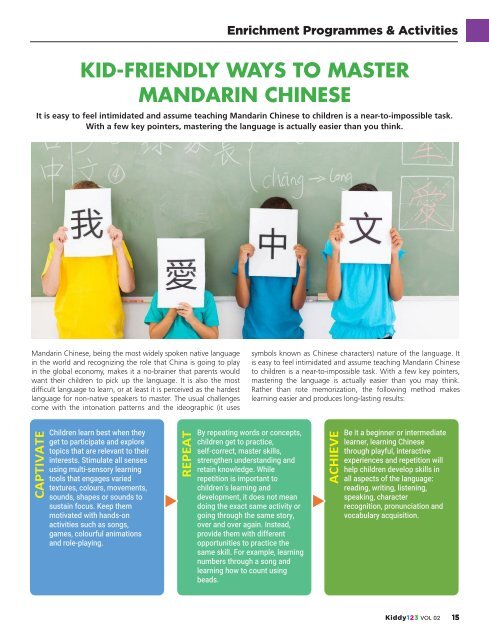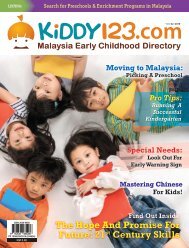all pages
You also want an ePaper? Increase the reach of your titles
YUMPU automatically turns print PDFs into web optimized ePapers that Google loves.
Enrichment Programmes & Activities<br />
KID-FRIENDLY WAYS TO MASTER<br />
MANDARIN CHINESE<br />
It is easy to feel intimidated and assume teaching Mandarin Chinese to children is a near-to-impossible task.<br />
With a few key pointers, mastering the language is actu<strong>all</strong>y easier than you think.<br />
Mandarin Chinese, being the most widely spoken native language<br />
in the world and recognizing the role that China is going to play<br />
in the global economy, makes it a no-brainer that parents would<br />
want their children to pick up the language. It is also the most<br />
difficult language to learn, or at least it is perceived as the hardest<br />
language for non-native speakers to master. The usual ch<strong>all</strong>enges<br />
come with the intonation patterns and the ideographic (it uses<br />
symbols known as Chinese characters) nature of the language. It<br />
is easy to feel intimidated and assume teaching Mandarin Chinese<br />
to children is a near-to-impossible task. With a few key pointers,<br />
mastering the language is actu<strong>all</strong>y easier than you may think.<br />
Rather than rote memorization, the following method makes<br />
learning easier and produces long-lasting results:<br />
CAPTIVATE<br />
Children learn best when they<br />
get to participate and explore<br />
topics that are relevant to their<br />
interests. Stimulate <strong>all</strong> senses<br />
using multi-sensory learning<br />
tools that engages varied<br />
textures, colours, movements,<br />
sounds, shapes or sounds to<br />
sustain focus. Keep them<br />
motivated with hands-on<br />
activities such as songs,<br />
games, colourful animations<br />
and role-playing.<br />
REPEAT<br />
By repeating words or concepts,<br />
children get to practice,<br />
self-correct, master skills,<br />
strengthen understanding and<br />
retain knowledge. While<br />
repetition is important to<br />
children’s learning and<br />
development, it does not mean<br />
doing the exact same activity or<br />
going through the same story,<br />
over and over again. Instead,<br />
provide them with different<br />
opportunities to practice the<br />
same skill. For example, learning<br />
numbers through a song and<br />
learning how to count using<br />
beads.<br />
ACHIEVE<br />
Be it a beginner or intermediate<br />
learner, learning Chinese<br />
through playful, interactive<br />
experiences and repetition will<br />
help children develop skills in<br />
<strong>all</strong> aspects of the language:<br />
reading, writing, listening,<br />
speaking, character<br />
recognition, pronunciation and<br />
vocabulary acquisition.<br />
Kiddy123 VOL 02 15



